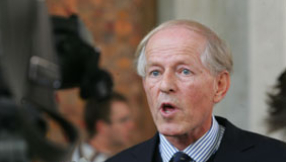
The book of Job is one of the most profound and moving in the Old Testament, speaking to the deep things of life and faith with its exploration of suffering and its soaring poetry.
It tells of the trials of Job, a man who was "blameless and upright; he feared God and shunned evil". He was rich, successful and had a large family, but then Satan asks God if he can test him to see how far his faith really goes (1:12). He loses his family, his possessions and his health. His three friends come and try to persuade him he must have done something to deserve it. A fourth friend tells him God is righteous and he has no right to complain. God himself concludes the debate with a glorious poem on the wonders of creation. Job becomes rich again and has another family, "And so he died, old and full of years" (42:17).
It's a wonderful book. So is asking whether Job even existed casting doubt on the Bible?
One of the key principles involved in interpreting the Bible is identifying what sort of literature you're reading. History is history (Kings and Chronicles, for instance) and is about what actually happened; poetry is poetry (Psalms, Song of Solomon). It's very important not to get them mixed up, so readers think the Beloved in the Song of Solomon really looked like one of Pharoah's mares (1:9).
Another type of writing is Wisdom literature, like Ecclesiastes and Proverbs, and Job belongs to this group. It's about how to live in the real world and still remain faithful to God.
The problem with Job is that at first sight it seems to combine two different genres. It starts, and ends, with a story. It talks about Job, and about Satan, and it's easy to assume that these events must actually have happened – that Job's children were killed, or that Satan comes and goes from God's presence like an unruly subject at the court of an earthly king. But then it goes into poetry – Job and his friends appear to communicate in the most wonderful verse.
And in real life, people don't do that. So the dialogue is made up, crafted by an inspired poet.
So if the dialogue is made up, why shouldn't we assume the "story" parts of the book are made up as well – told like a novel, rather than a history book? They are are no less the inspired word of God, but we are closer to what the author originally intended.
If this is true, it means three things.
1. It means we are honouring the intention of the writer (or writers). Christians are concerned about the truth, and if we have a wrong understanding of the Bible we need to correct it.
2. Understanding the context of the book preserves us from falling into errors. We shouldn't think that the Bible really teaches that Satan comes and goes from God's presence as Job appears to suggest. It is a literary device, not a historical or theological statement. Neither should we think God literally hands one of his children over to Satan to prove a point; he doesn't treat us like that.
3. It helps us focus on what's really important about the book. It teaches the value of faithfulness in trials. It reminds us that God's love never fails, even when it appears to be hidden from us. It tells us there are things about suffering we will never understand. It also reminds us above all that God is God, the creator of the universe, and that righteousness matters whether it seems to offer a material payback or not.
Follow Mark Woods on Twitter: @RevMarkWoods













